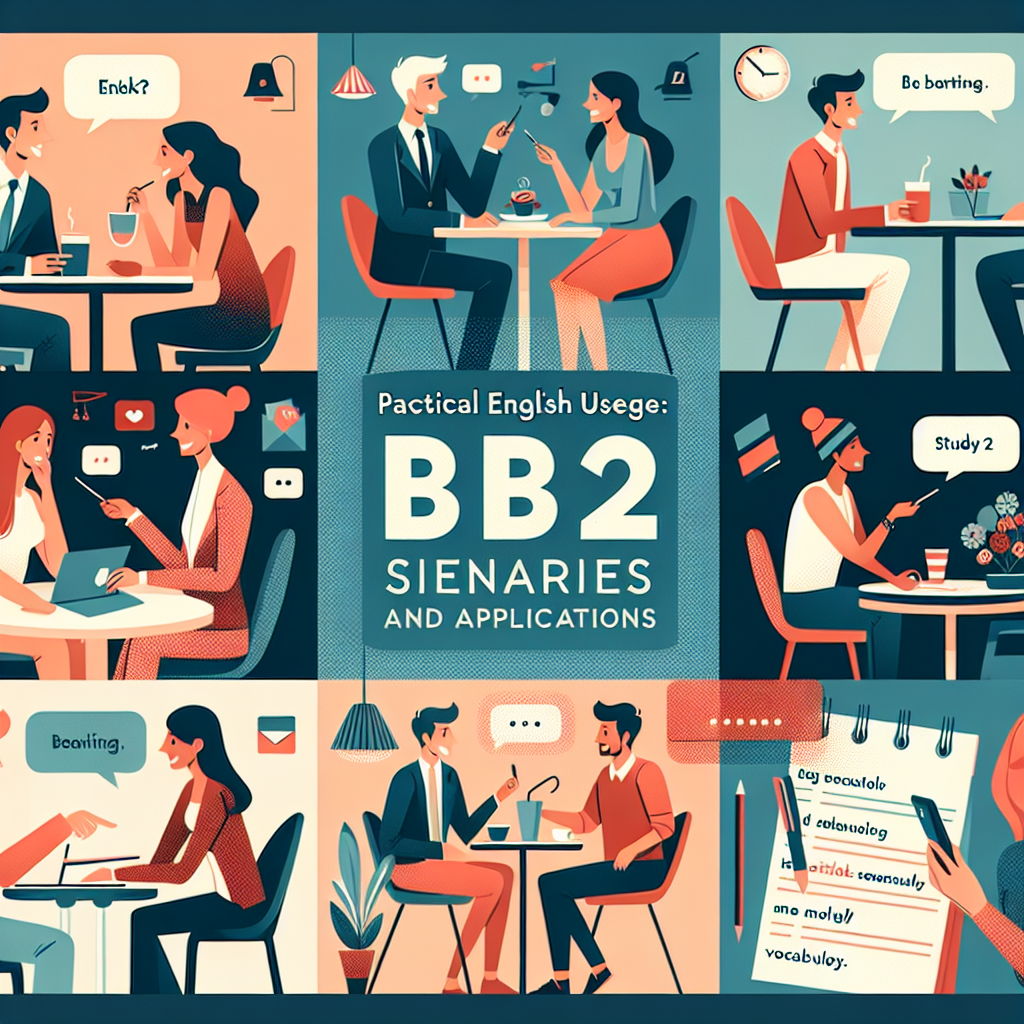` headings for the blog post targeting the keyword “Practical English Usage: B2 Scenarios and Applications”:
“`html
Practical English Usage: B2 Scenarios and Applications – Mastering Intermediate English
Mastering Practical English Usage: B2 Scenarios and Applications
Understanding the B2 English Level: What It Means for Practical Communication
“`html
Navigating Everyday Situations with B2 English Proficiency
Improving your ability to handle everyday scenarios in English is crucial at the B2 level. Whether you’re shopping, dining out, or traveling, a solid grasp of practical English usage can make your experiences much smoother. In this section, we’ll discuss how you can effectively apply your intermediate language skills to these common situations, emphasizing the importance of understanding colloquial speech and cultural nuances.
Effective Workplace Communication: B2 English in Professional Settings
At B2 proficiency, engaging in professional dialogue becomes more nuanced. This part of the post aims to guide B2 learners through the subtleties of workplace communication – from participating in meetings to writing clear and concise emails. We’ll provide insights on improving your business vocabulary and tips on how to articulate your ideas with the appropriate level of formality.
Academic Success with B2 Level English: Strategies for Students
For students at the B2 threshold, mastering English becomes key to academic success. This section is tailored for those who wish to better understand academic texts, participate in discussions, or prepare for presentations in English. We will delve into strategies that will aid in expanding your academic vocabulary and improving your ability to comprehend complex concepts in English.
English for Leisure Activities: Enhancing Your B2 Experience
Leisure activities present unique opportunities for B2 learners to practice and enjoy English in a relaxed setting. Here, we will explore how engaging with entertainment mediums like films, music, and books can not only help improve your language skills but also deepen your appreciation for English-speaking cultures. Expect practical tips for language learning while indulging in your favorite hobbies.
B2 English for International Travel: Communicating with Confidence
Travel opens doors to diverse communicative challenges and experiences. Being able to convey your needs and understand others while traveling is essential at the B2 level. This section will provide you with guidance on practical language usage for various travel contexts, from asking directions to understanding local customs, ensuring you can navigate with ease and confidence.
Online Interactions and Social Media: The B2 English Perspective
In the digital age, fluency in online communication is a must-have skill. This segment focuses on the nuances of virtual communication for B2 English learners, including understanding internet slang, participating in online forums, and maintaining a professional online presence. We’ll examine how to effectively communicate in English in the ever-evolving digital landscape.
“`
Everyday Situations: Practical English for Work, Travel, and Socializing
English is not just a language, but a key that unlocks doors in professional, travel, and social arenas. Practical English for work is a necessity for anyone aiming to advance their career in the international business world. Mastering workplace vocabulary, idiomatic expressions, and formal email etiquette can significantly impact your ability to communicate effectively with colleagues and clients. Understanding these intricacies of the language ensures you can navigate meetings, give presentations, and collaborate on projects with confidence and ease.
As for travel, knowing English can transform your experience from bewildering to enriching. With English, you can ask for directions, order food, and seek assistance with assurance. The comfort of being able to read signs, converse with locals, and understand cultural nuances cannot be overstated. It provides a safety net that many travelers find invaluable, especially when navigating airports, public transport, or unexpected situations that require clear and concise communication.
In the realm of socializing, English acts as a common dialect bridging diverse backgrounds. Possessing the skill to engage in small talk, tell stories, or simply share your thoughts and opinions in English can lead to meaningful connections. Whether at a casual gathering, global event, or even dating, the ability to express yourself clearly and understand others opens up a world of opportunities for enriching your social life. Furthermore, it allows you to enjoy international media, such as books, movies, and music, adding depth to your recreational activities.
However, mastering everyday English is not only about knowing the correct words and grammar. It’s about grasping the context in which to use them, recognizing the informal and formal tones, and developing an ear for the rhythm and flow of the language as it’s spoken by natives. This level of fluency ensures that everyday interactions, whether at the supermarket or at a networking event, are handled with poise and understanding, fostering better relationships and a more immersive experience in English-speaking environments.
Business English Essentials: Negotiation, Presentations, and Correspondence at B2 Level
Mastering Business English is pivotal for professionals who aim to navigate the global business landscape with confidence and proficiency. Particularly at the B2 level, individuals are expected to handle communication with a degree of fluency that allows for fluid negotiation, clear presentations, and effective correspondence. Understanding the nuances and subtleties within these three key areas is not just a learning goal; it’s a strategic investment in one’s professional development.
Negotiation plays a central role in business interactions, involving discussions that can lead to amicable agreements between parties. At the B2 level of Business English, practitioners should be adept at expressing opinions, presenting options, and advocating for terms in a manner that is both persuasive and considerate. The ability to comprehend and use nuanced language for negotiating can mean the difference between a successful contract and a missed opportunity. Hence, focusing on expanding one’s vocabulary with terms pertinent to bargaining situations, as well as role-playing negotiation scenarios, are integral parts of honing this skill.
When it comes to Presentations, delivering your message effectively is key. This requires not only a well-structured speech but also the ability to engage with the audience and respond to queries confidently. At the B2 level, learners are expected to structure their presentations with a clear introduction, body, and conclusion, using appropriate transitions to guide their audience through the information. Emphasis is also placed on mastering the skill of presenting complex ideas with clarity and impact, making use of visual aids, and adapting the presentation style to fit the context and audience.
Effective Correspondence is the backbone of business communication, which encompasses emails, reports, proposals, and other written forms. To excel in this domain, individuals must be proficient in not only the mechanics of writing—grammar, punctuation, and spelling—but also in the more subtle art of tone and style. The ability to craft clear, concise, and professional documents reflects a person’s business acumen and attention to detail. At B2 level, emphasis is placed on developing skills to write with precision and diplomacy, ensuring that the intended message is conveyed successfully and that relationships with clients and partners are maintained and strengthened.
Academic Skills: Utilizing B2 English in Studies and Examinations
Achieving a B2 level of English proficiency, as defined by the Common European Framework of Reference for Languages (CEFR), is a crucial milestone for non-native English speakers embarking on academic pursuits. This intermediate level signifies a student’s capability to understand the main ideas of complex text, interact with a degree of fluency, and produce clear, detailed writing on a wide range of subjects. In an academic context, this facilitates a more effective comprehension of course materials, academic papers, and enables active participation in discussions and seminars.
When it comes to studying, students with B2 English proficiency are better positioned to tackle advanced resources such as research papers and textbooks, which predominantly utilize complex sentence structures and specialized vocabulary. Strategic reading techniques such as skimming for main ideas and scanning for specific information become more accessible, allowing these students to study more efficiently. Furthermore, note-taking and summarizing skills improve as students are able to understand nuances and critical arguments, which are crucial for synthesizing academic material and for success in examinations.
In the realm of examinations, a B2 level of English empowers students to approach different types of questions with confidence. Whether it’s writing essays, comprehending case studies, or analyzing data, students are expected to demonstrate not only their knowledge of the content but also their language proficiency. Effective exam techniques, such as understanding exam questions and structuring responses, become inherently linked with students’ language abilities. Mastery of B2 English allows for precise expression of thoughts and a clear argumentation style, which are essential for excelling in essay-based questions and for navigating multiple-choice tests with linguistic intricacies.
Moreover, a solid B2 level equips students with the linguistic tools needed for various forms of communication. During group work and presentations, these students can convey complex ideas more fluently and negotiate viewpoints with greater ease. This level of language competency ensures that they can actively contribute to collaborative tasks and also comprehend the contributions of their peers. For oral examinations, it enables a spontaneous and coherent discourse, as well as the capacity to deal with unpredictable questions, which is key to a high level of performance during these evaluations.
Cultural Nuances and Idiomatic Expressions: Enhancing Your B2 English
Understanding cultural nuances and idiomatic expressions is pivotal in achieving fluency at a B2 English level. Cultural nuances refer to the subtle aspects of a culture that are often embedded in language, such as humor, etiquette, and indirect speech. These delicate points can be easily missed by non-native speakers. Moreover, idiomatic expressions—phrases where the meaning isn’t deducible from the individual words—pose an additional challenge. Grasping these phrases is essential, as they frequently pepper native English conversations.
For example, consider the idiom “beat around the bush.” To a B2 English learner unfamiliar with the expression, this could suggest a literal action. However, it actually means to avoid talking about a topic directly, typically because it is uncomfortable or problematic. Similarly, idiomatic phrases like “spill the beans” or “hit the nail on the head” can confuse learners because their meanings—revealing a secret and describing something done with exactness or precision, respectively—are not immediately obvious.
Engaging with authentic English media, such as movies, television shows, and novels, can help one pick up on these cultural intricacies. Additionally, regular conversations with native speakers can provide context and usage examples for idiomatic expressions. Practicing these expressions in context is necessary for learners to not only remember them but also to understand when and how they are used appropriately, a key aspect of cultural nuances in communication.
Beyond mere vocabulary expansion, appreciating cultural nuances and idiomatic expressions enriches the language learning experience. It allows learners to connect with English speakers on a deeper level and participate in more meaningful conversations. After all, language isn’t just about grammatical correctness—it’s also about conveying and understanding the full richness of its cultural tapestry.


